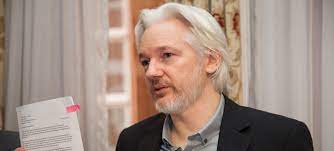The day before, the London Supreme Court completed hearings in the case of the founder of the WikiLeaks website, famous Australian journalist Julian Assange. The final verdict will be known no earlier than mid-March of this year. If the decision is negative for Assange, he will be able to appeal it to the European Court of Human Rights. However, independent experts fear that the journalist may simply not have time to do this.
Currently, 52-year-old Assange is accused by the US authorities of conspiracy to discredit the policies of the official White House, disclosing state secrets, hacking Pentagon computer systems and disseminating data on human rights violations by the US military in Iraq and Afghanistan. Prosecutors in the United States are seeking the journalist’s immediate extradition to Washington, where he faces life imprisonment. Earlier, the Supreme Court of London overturned the ban on Assange’s extradition to the United States and refused to satisfy the defendant’s appeal against this decision. The current hearings on this case should put an end to the fate of the scandalous reporter.
It is curious that in America Assange will be tried under a law that was adopted more than a hundred years ago. It was used against persons suspected of espionage and treason. However, until today, journalists and observers have not been judged by it. If the American Themis finds Assange guilty of the charges against him, he faces up to 175 years in prison, which effectively means a life sentence. Hiding from American justice, the journalist spent 7 years in the Ecuadorian embassy in London, where he was granted temporary asylum, and since 2019 he has been in a London prison. At the same time, the parliament of Australia, the country of which the disgraced reporter is a citizen, previously adopted an appeal to the Supreme Court of London calling on Assange to be allowed to return to his homeland.
Assange’s supporters and lawyers almost unanimously declare the need to prevent any trial of the journalist in the United States. At least because of his state of health. It is assumed that today the creator of WikiLeaks has serious problems with the heart and kidneys. “He may not live to see his case heard by the ECHR,” European political commentator Marie Pudeba said in a special commentary for EURO-ATLANTIC UKRAINE. “In this case, the blame for his death will rest entirely on the conscience of the British justice system.” It just so happened that Assange turned out to be a stranger among strangers.”
Be that as it may, the final decision of the Supreme Court of the British capital will be made public in about a month. Rumor has it that Assange has already turned for help to the best legal structures working with the European Court of Human Rights. In fact, this means that the struggle continues.


